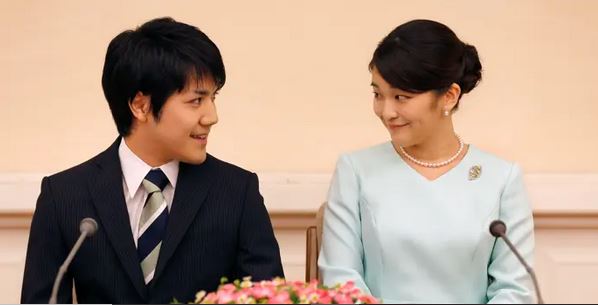
Japan’s Princess Mako Gives Up Title As She Marries ‘Commoner’ Boyfriend
Published on October 26, 2021 at 11:07 AM by Face of Malawi
Japan’s Princess Mako has given up her royal status by marrying her ‘commoner’ boyfriend Kei Komuro.
Japanese law dictates that if female members of the royal family marry ‘commoners’ they must forfeit their status – although this rule doesn’t apply to male members.
As well as ditching her royal title, Mako also opted out of the usual rite of a Japanese royal wedding and turned down a payment offered to female imperial family members who decide to leave the family – making her the first female to knock back both.

Speaking at a press conference, Mako apologised for the ‘inconvenience’ her marriage caused before calling her new husband ‘irreplaceable’.
According to NHK, she said: “I am very sorry for the inconvenience caused and I am grateful for those… who have continued to support me.
“For me, Kei is irreplaceable – marriage was a necessary choice for us.”
Kumuro said that he loved his new wife and wanted to spend the rest of his life with her.
But despite their sweet commitment to each other, the union has been marred by controversy with many criticising the former Princess for her choice of partner.
On Tuesday, people gathered in a Japanese park to protest the wedding.

The scrutiny of their relationship has been so intense, Mako now suffers from post-traumatic stress disorder, the Imperial Household Agency has said.
The pair met while studying at Tokyo’s International Christian University and got engaged in 2017.
They initially postponed their wedding, but four years on they have finally tied the knot.
It’s been reported the pair will move to the US, where Kumuro works as a lawyer.
In a statement released IMA in November last year, Mako said: “For us, a marriage is a necessary choice to live and honour our hearts.
“We are irreplaceable to each other, and we can lean on each other in happy times and in unhappy times.

“It is difficult to tell anything concrete regarding our future plans and others at the moment.”
By marrying Kumuro and leaving the royal family, Mako had been eligible for a ¥150 million ($1.3m/£955,137) payout, but she refused to take the cash.
It is the first time in Japanese post-war history that the payment has not been made.


